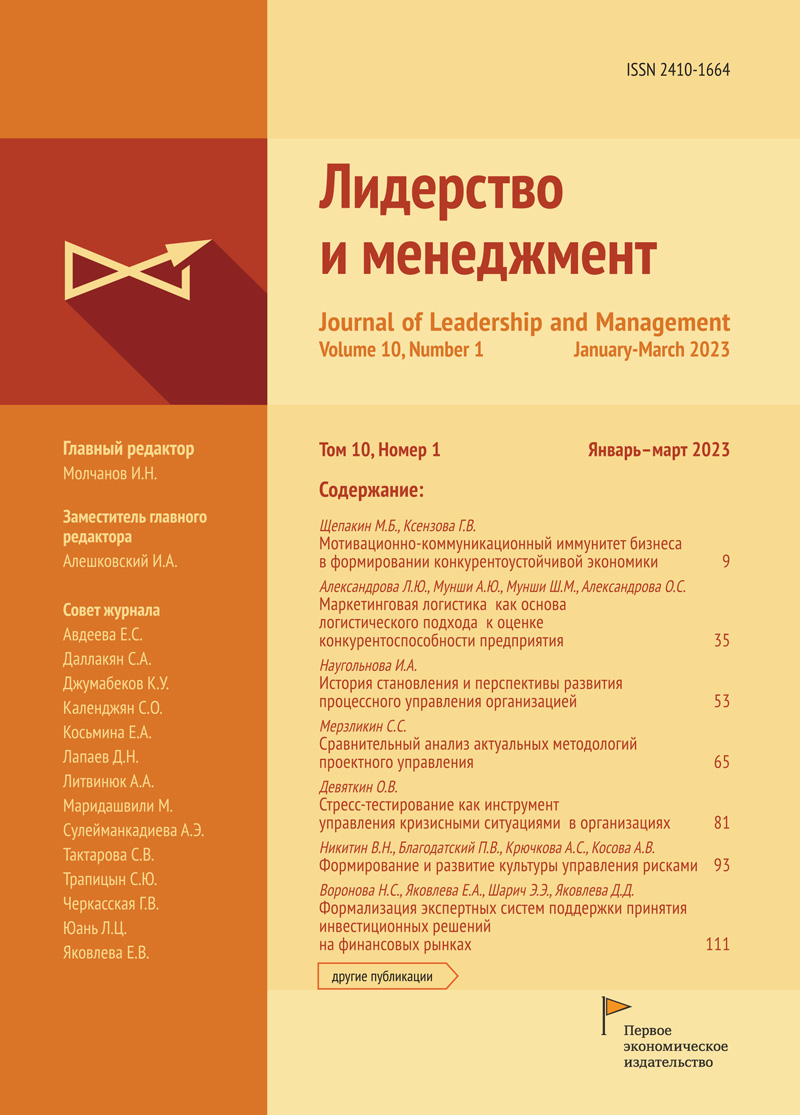Improving the measurement and evaluation of human capital as a factor of organizational development
- 作者: Kartashova L.V.1, Savochkin A.V.1
-
隶属关系:
- Plekhanov Russian University of Economics
- 期: 卷 10, 编号 1 (2023)
- 页面: 311-330
- 栏目: Articles
- URL: https://journals.eco-vector.com/2410-1664/article/view/608008
- DOI: https://doi.org/10.18334/lim.10.1.117349
- ID: 608008
如何引用文章
详细
The article shows the main approaches to the formation and development of human capital. The scientific principles underlying the choice of methods for assessing human capital management and directions for using its results in practice are formulated. The characteristic of the existing approaches to the measurement and analysis of human capital is given. Their distinctive features, advantages and disadvantages are analyzed. Recommendations for the effective use of various methods of assessment and formation of human capital, depending on the situational factors of the functioning of the organization, are formulated. Challenges in the field of human capital formation and opportunities for further research in this area are identified.
作者简介
Larisa Kartashova
Plekhanov Russian University of Economics
Email: Kartashova.LV@rea.ru
Andrey Savochkin
Plekhanov Russian University of Economics
Email: Savochkin9713@mail.ru
参考
- Human capital theory: assessing the evidence for the value and importance of people to organisational success in partnership with The CIPD Technical report May 2017. [Электронный ресурс]. URL: https://www.cipd.co.uk/Images/human-capital-theory-assessing-the-evidence_tcm18-22292.pdf (дата обращения: 18.12.2022).
- Anam O.A., Fatima A.H., Majdi A.R.H. Effects of intellectual capital information disclosed in annual reports on market capitalization: evidence from Bursa Malaysia // Journal of Human Resource Costing and Accounting. – 2011. – № 2. – p. 85–101.
- Armstrong C., Flood P.C., Guthrie J.P., Wenchaun L., Macurtain S., Mkamwa T. The impact of diversity and equality management on firm performance: beyond high performance work systems // Human Resource Management. – 2010. – № 6. – p. 97–98.
- Aryee S., Walumba F.O., Seidu E.Y.M., Otaye L.E. Developing and leveraging human capital resource to promote service quality: testing a theory of performance // Journal of Management. – 2016. – № 2. – p. 480–499.
- Bersin, J., Collins, L. and Mallon, D. (2016) People analytics. In: Deloitte. Global human capital trends 2016. Available at: www2.deloitte.com/content/dam/Deloitte/global/Documents/HumanCapital/gx-dup-globalhuman-capital-trends-2016.pdf [Accessed 21 April 2017]
- Donate M.J., Pena I., Sanchez De Pablo J.D. HRM practices for human and social capital development: effects on innovation capabilities // International Journal of Human Resource Management. – 2016. – № 9. – p. 928–953.
- Роберт С. КАПЛАН Дейвид П. Нортон Сбалансированная система показателей От стратегии к действию. - ЗАО «Олимп-Бизнес», Москва, ebook © BigSun, 2004.
- The Human Capital Index. 2020 Update Human Capital in the Time of COVID-19/ World Bank Group 2021 International Bank for Reconstruction and Development / The World Bank /HCI/HCI_2pager_RUS.pdf
- J. Stewart Black, Competing for and with Human Capital. Routledge/Productivity Press, 2019. P. 19-24
- Annual Reports Proxies. [Электронный ресурс]. URL: https://investorcenter.slb.com/financials/annual-reports-proxies (дата обращения: 18.12.2022).
- Richard M. Scheffler, Nicholas C. Petris, Francesca Borgonovi, Timothy T. Brown. Social Capital, Human Capital and Health. Centre for Educational Research and Innovation. 2010. P. 18-20
- Богатырева В. В. Роль социального и человеческого капиталов в формировании и функционировании социально-экономической системы государства // Экономическая наука сегодня. – 2020. – № 11. – c. 5-11.
- Ластовкина Д. А. Социальные сети в структуре социального капитала: теория и практика исследования // Научная мысль. – 2021. – № 4-1(42). – c. 99-108.
- Медведева О. В. Ключевые особенности капитала здоровья как формы человеческого капитала // Московский экономический журнал. – 2021. – № 7. – c. 62. – doi: 10.24411/2413-046X-2021-10445.
- Ганина С. А. Анализ общей политики отечественных предприятий в области стратегического управления человеческим капиталом // Вестник Российского нового университета. Серия: Человек и общество. – 2021. – № 3. – c. 62-71. – doi: 10.25586/RNU.V9276.21.03.P.062.
- Is the significance of human capital changing due to the ongoing fourth technological revolution of Industry. Cardinal Stefan Wyszynski University in Warsaw, 2019. [Электронный ресурс]. URL: https://www.researchgate.net/institution/Cardinal_Stefan_Wyszynski_University_in_Warsawhttps:// (дата обращения: 21.12.2022).
- The 2021 Global Human Capital Trends report. A public sector perspective: Human Capital Trends 2021. Making the shift from “survive to thrive”. [Электронный ресурс]. URL: https://www2.deloitte.com/us/en/pages/public-sector/articles/human-capital-trends-government-perspective.html (дата обращения: 21. 12.2022).
- This annual report details the activities of the Human Capital Umbrella Program, December 2021. [Электронный ресурс]. URL: https://www.worldbank.org/en/publication/human-capital (дата обращения: 21.12.2022).
- Проект развития человеческого капитала | World Bank, 2021. [Электронный ресурс]. URL: https://www.vsemirnyjbank.org›ru/publication/human-capital (дата обращения: 21.12.2022).
- Human Capital 2020 HCI: Country Briefs and Data. [Электронный ресурс]. URL: https://www.worldbank.org›en/publication/human-capital (дата обращения: 21.12.2022).
- Matthias Regier and Ethan Rouen. The Stock Market Value of Human Capital Creation/ Business Research for Business Leaders. [Электронный ресурс]. URL: ttps://www.hbs.edu/ris/Publication%20Files/21-047_1b1a3b41-aca4-4254-96ee-ca825345dde8.pdf (дата обращения: 21.12.2022).
补充文件








